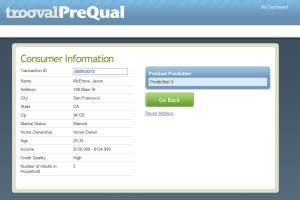Consider this scenario: Two grandmothers walk into a Harrah’s hotel/casino in Las Vegas. Both ladies put $5 into a slot machine, and unfortunately, neither hits the jackpot — both lose their $5. One of these kindly old ladies will go on to spend thousands of dollars at Harrah’s, while the other will walk away without spending another dime. How do you know which will continue to spend?
Applied to a larger picture, companies spend millions of dollars on technology, like cognitive and behavioral analysis and intelligence mining, to attempt to create a model that will accurately predict which of their new visitors will be the better customer. As you can imagine, if businesses can target their marketing, deals, loyalty programs, etc. at the “better” customer, their dollars are better spent.
Of course, the refined analysis, software, databases, and specialists required to run predictive modeling is expensive, time-consuming and is really only affordable for the corporate giants of the world. Enter Trooval, a Bay Area start-up that is helping companies distinguish between the customers that will spend money and the customers that won’t, so that they can target them accordingly.
Trooval Founder and CEO Jonathan Lowenhar tells me that companies like Capital One and AMEX have found ways to integrate effective realtime predictive modeling into their customer acquisition strategies, but he says that only about 5 percent of businesses are taking advantage of this kind of technology.
Lowenhar spent 15 years in Las Vegas in the casino gaming industry, part of the time as VP of Marketing at Harrah’s, where he learned firsthand that customers at casinos (and across industries) are all generally treated the same. There wasn’t a science to how casinos were approaching their customers. At Harrah’s, the team developed a system that would aggregate all the known information about the little old ladies of the world, including the speed at which they play the game, how much they spend, the distance they live from the casino, etc. Of course, Harrah’s had to hire a big team to do this.
 Lowenhar says that this is the marketer’s dream: Being able to understand, for any given consumer, where they sit in regard to loyalty potential. Thus, the ultimate value proposition for Trooval is the ability give marketers realtime, actionable scores on consumer leads, prospects, and their existing customers. Trooval does this by way of a simple alphanumeric score — that tells marketers just that.
Lowenhar says that this is the marketer’s dream: Being able to understand, for any given consumer, where they sit in regard to loyalty potential. Thus, the ultimate value proposition for Trooval is the ability give marketers realtime, actionable scores on consumer leads, prospects, and their existing customers. Trooval does this by way of a simple alphanumeric score — that tells marketers just that.
Through its predictive analytics software tool, Trooval allows companies to access accurate predictions with one cloud app. Predictions are based on that mash of readily-available public consumer data and companies can take advantage of the startup’s API connection to enrich their businesses’ leads with third party data from both public and boutique sources.
While Trooval has begun working with certain retail outlets and companies in the time-share industry, their software is applicable to auto sales, financial services, mortgage, and student loan lending companies — any industry where the cost of sales and marketing (and the potential sales price) is high.
Too many people suffer from flawed credit reports today, and they really are no longer an accurate prediction of who can pay and who can’t; what’s more, just because a consumer has made a big purchase in the past, doesn’t mean that they will again. Companies need to know this kind of information, who is most likely to pay for that big high ticket item?
The B2B2C company can work with businesses to have them up and running on Trooval in just a few weeks.
Trooval has raised $2.8 million in seed and series A rounds from North Bridge Venture Partners and AngelList.
For more on Trooval, check it out at home here.
